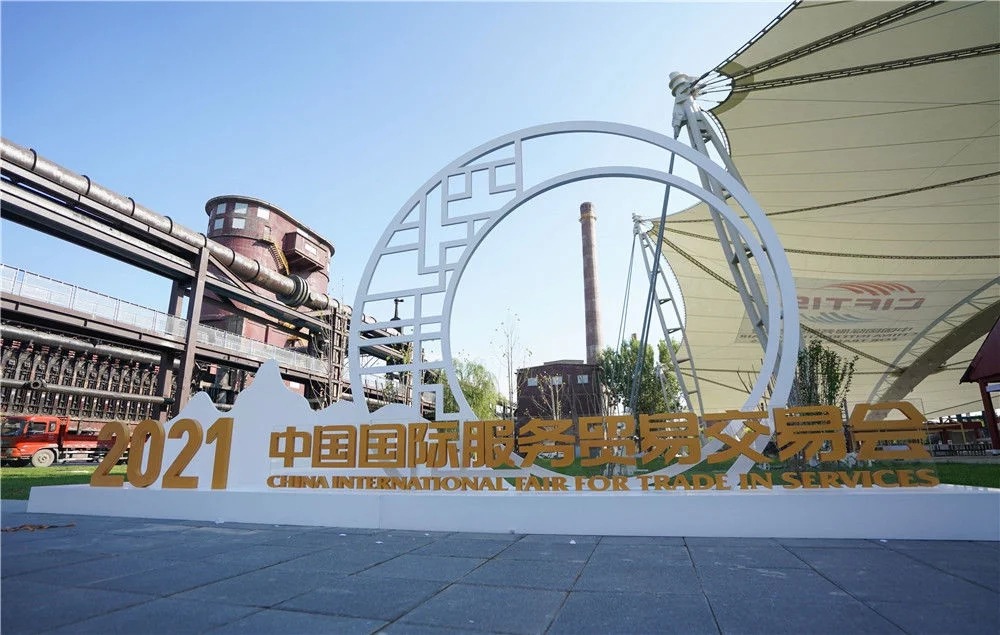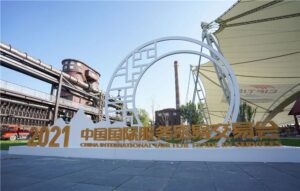

With the theme of “Digital Unlocking the Future, Services Promoting Development”, the China International Fair for Trade in Services (CIFTIS) 2021 will open on September 2. During the 6-day period, hundreds of activities will be organized in an orderly manner by combining online and offline, and dozens of achievements will be released for the first time.
In 2021, on the basis of continuing to use the National Convention Center, SHougang Industrial Park, a new landmark of Beijing’s urban Renaissance, will be used as a special venue for the first time. The former industrial relics have become the main part of the conference facilities. The cluster exhibition complex of Shougang Park of The Service Trade Association and other landmark landscapes of Shougang, such as Qunming Lake, Xiuchi, ski jumping platform and iron and steel blast furnace, are shining and shining.
Experts point out that China’s development model at the expense of the environment is gone forever. In the new stage of development, digital economy and trade in services are rapidly emerging as new engines of development, which will strongly drive high-quality development in China and boost confidence in global economic development.
International guests voted with their feet, reflecting the attraction of FSTC or sino-foreign cooperation in service trade. It is reported that this year, more overseas countries and regions and foreign institutions in China held exhibitions online or offline, and the international participation was further enhanced. World top 500 and leading enterprises in the industry accounted for 18%, 9 percentage points higher than last year.
Observers pointed out that as one of the three major exhibition platforms for China’s opening up to the outside world, FSTC has become an important platform for win-win cooperation and exchanges between China and foreign countries, which will fully reflect China’s important contribution to the world economy.
In recent years, opening-up and cooperation in the service sector has become an increasingly important driving force for China’s economic development. Statistics show that in the first half of this year, the added value of China’s service sector reached 29.6 trillion yuan, accounting for 55.7 percent of the COUNTRY’s GDP, up from 54.5 percent last year, providing strong industrial support for high-quality development of trade in services.
Fu Chenggang, chief economist of the International Federation of Financial Centers, said that the event will further boost confidence in global development and provide opportunities for economies and market participants to understand each other and strengthen cooperation as the global epidemic situation remains grim.
Since the outbreak of the epidemic last year, digital technology has been widely used in China, and more and more services trade has been transferred from offline to online, further accelerating the digitalization process of service trade. Statistics show that in 2020, China’s digital economy became the second largest in the world, with the added value of core industries in the digital economy accounting for 7.8 percent of GDP.
This expo is the first to set up a digital service area, which will fully display the latest frontiers, latest achievements and technology applications in China’s unmanned driving, intelligent transportation, building digitization, new audio-visual services and other services.
“With the improvement of computing power and the acceleration of transmission, digital trade with data as the production factor and digital delivery as the main feature is booming, and is becoming a new form of global trade and a new engine for future trade development.” Said Chen Chunjiang, director general of the Ministry of Commerce’s Department of Service Trade and Trade services.
Wu Hequan, academician of the Chinese Academy of Engineering, believes that the digital economy meets the needs of high-quality development in China. While factors of production such as labor, land and capital continue to play a role, data, as a new factor of production, is promoting productivity growth and economic structure optimization.
Digital trade is becoming a new growth point in China’s service trade. Chen chunjiang said that according to the statistics of THE United Nations Conference on Trade and Development (UNCTAD), China’s service trade volume that can be delivered digitally in 2020 reached us $294.76 billion, up 8.4 percent year on year and accounting for 44.5 percent of the total service trade, becoming a new growth point of service trade.
In September 2020, at the China International Fair for Trade in Services Global Summit on Trade in Services, China put forward three proposals on the development of the service sector, and solemnly announced that Beijing would build a national comprehensive demonstration zone for further opening up the service sector and set up a pilot free trade zone featuring scientific and technological innovation, opening up the service sector and digital economy.
In less than a year, Beijing District 16 and Beijing Economic and Technological Development Zone, as well as leading departments in science and technology, commerce, finance, education, information, and medical and health care, respectively formulated work plans to promote the development of the National Comprehensive Demonstration Zone for further opening up of the service sector and the “Two Zones” of the Beijing Pilot Free Trade Zone. The groups (districts) covered by the Beijing Pilot Free Trade Zone have formulated their respective implementation plans, making the construction of the two zones a new beacon for Beijing’s development.
A number of leading enterprises and demonstration foreign investment projects have taken root in Beijing. Policies first or first implemented nationwide further release the dividend of institutional innovation; The business environment has been improved, benefiting businesses and people alike. Yang Jinbai, vice mayor of Beijing, said that up to now, 202 of the 251 tasks in the “two Districts” plan have been implemented, with an implementation rate of 80.5 percent, and 17 of the first and first policy innovations have been implemented nationwide.
The changes in Beijing are a microcosm of China’s high-level opening-up. In the process of building a new development pattern, many places in China have become “hot spots” for high-level opening-up with the help of policies. Tianjin, Shanghai, Chongqing and Hainan have been added to the comprehensive pilot areas for further opening-up in the service sector. Promoting best practice cases on pilot projects to comprehensively deepen the innovative development of trade in services across the country…
In the face of the new trends and changes brought by the digital economy, more and more enterprises are turning the service trade Fair into an important platform for exhibition, opening and cooperation. The ready service trade meeting is about to welcome guests from all directions. Zhuang Rui, a professor at the National Institute of Opening-up at the University of International Business and Economics, said that through exchanges, Chinese and foreign companies can find more new partners. A new wave of high-level opening-up is surging in the process of exploring ways of higher-level institutional opening-up, and mutually beneficial cooperation is accelerating.




